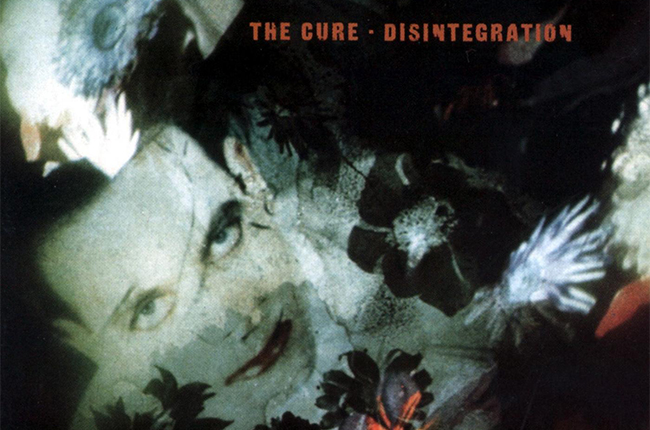Almost a year ago, on its anniversary, established music writers the world over revisited a love affair that begun 25 years ago with the eighth studio album, Disintegration, by British alternative-gothic rock band The Cure. The reviews (there are several immersive, beautifully written ones – do have a read) reflect the nostalgia of youth, and the importance of the album in the writers’ wild years. Writers and fans reminisced about falling asleep to The Same Deep Water As You and recalled the surprising comfort that came with what was arguably, an album that singed of frustration, melancholy and mid-life angst. But 25 years on, the album is still making hearts ache. Simply put, it’s a beautiful, enduring and important album.
While I won’t pretend to have the breadth of musical prose to do justice to an album review, I was keen to reflect on the importance of this album in my life. I was a mere three years old when the album came out in 1989, which makes me 28 years old today – a trickle away from the symbolic turning-point of 30. This was an important age for frontman Robert Smith. While The Cure was already well established in popular culture through albums like Kiss Me Kiss Me Kiss Me, Smith imploded upon himself with the terror of tipping into his fourth decade, perceiving himself to have not yet created a masterpiece, and holed himself away into a cauldron of dark ideas and gloomy sounds which formed the glistening core of Disintegration.
I remember, as a child, my parents playing Disintegration at dinner parties (the appropriateness of which we could argue for days.) Reflecting back, I didn’t know the name of the songs, the band name, or the album’s critical acclaim – I just knew the sound, and the feeling that accompanied it. The feeling of being up past my bedtime, of the sullen darkness that the night brought, and the perverse awareness of adult conversations fuelled by wine.
Looking back, I can see the foundations of a musical love affair crystallising. With every second as the album ticked over, from the ironic grandeur of the opening track Plainsong, with its ethereal chimes, to the solemn promise of Lovesong, to the sexually-infused, nightmarish terror of Lullaby (and yes, I am sure I fell asleep to this as a child) and the rickety, seething pop of Fascination Street (the lyric “Pull on your hair, pull on your pout” is intoxicating, and the glittering keyboard lifts my soul.) I didn’t know it then, but it was the foundation of everything that was to come – a musical obsession with rich, layered synths, dark lyrics and effervescent keyboard.
The album itself is complex; sprawling and yet dense. There are moments of intense, poignant warmth (Pictures of You), crushing weight (Prayers for Rain) and dreamy obsession (The Same Deep Water As You.) Sounds, too, are used beautifully to add texture – such as Smith’s breathless, panicked whispers and eerily plucked violin in Lullaby and the haunting end-note of Closedown, a slam of fingers on an organ which reverberates throughout your brain long after the song has ended.
The videos themselves are fascinating; delightfully simple, visceral and visually saturated. In Lullaby Smith lays in bed, frozen in a spellbound nightmare, his lips pressed to a heaving spiderweb which covers his mouth. In Fascination Street, wind ruffles through his hair while his lips curl into a smirk, streetlight chaotically flickering in the background. The band’s aesthetic reflects the androgynous, gothic look that they were famous for (and let’s be real, Smith’s eyeliner and lipstick still makes my heart skip a beat.)
Although the record label wasn’t quite sure the world was ready for Smith’s morose, introspective creation, Disintegration was critically acclaimed; described deservedly as getting things “unequivocally, utterly and completely right”. Indeed, Disintegration pulls you in and makes you feel things – warmth and comfort, bitter, torturous, heart-wrenching sadness and beautiful, spine-tingling joy. Smith did what he set out to do – create a masterpiece. As the seconds tick over – and paranoia increases – towards my own symbolic ‘coming of age’ (August 2016, in case you’re interested,) I take stock in what The Cure delivered, and am vicariously fuelled through the ambition of Robert Smith that, perhaps surprisingly, created the moody magnificence of Disintegration.
—
Disintegration aside, if you feel like a few blissful sidesteps, a handful of other personal favourites include:
- The romantic nostalgia of Robert Smith’s collaboration with Crystal Castles on the song Not in Love
- The weird, odd-ball mash of disjointed pop through Why Can’t I Be You? from the Kiss Me Kiss Me Kiss Me album
- The light, sparkly (and yet oddly pithy) Close to Me from The Head on the Door
- A Forest from Seventeen Seconds (where we get a real tease of what’s to come in Disintegration – moody, dark, atmospheric sound)

